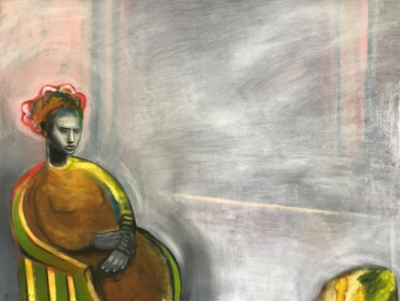.
.
“Footsteps of Spring,” a short story by Tom Stapleton, was a short-listed entry in our recently concluded 61st Short Fiction Contest, and is published with the consent of the author.
.
.
___
.
.
“Meditation,” by James Brewer

.
Footsteps of Spring
by Tom Stapleton
.
…..How long has it been now? Warren wondered as he pulled into the facility parking lot for what had to be the 1000th-plus time. It must be going on five years, he calculated. As he closed the car door the clock tower on the campus a few hundred yards away came into view where he’d proposed to Molly so many years before in the college quad fringed with brightly blooming yellow flowers. Down on one knee, he’d handed her a hastily picked bouquet and posed the question, to which she answered, unhesitatingly, yes, a hand to her mouth, tears of joy in her eyes. When he sprang to his feet to hug her they both lost their balance and, in a mirthful embrace, tumbled together through the flower beds. Each year on their anniversary he presented her with a luxuriant bouquet.
…..Walking along the familiar corridor to his wife’s room, he tried to remember back longer than five years, back to when he’d first become concerned. He estimated it was probably seven or eight years. But it could’ve been longer. These days, in his 70s, his memory was becoming less and less reliable.
…..He’d first become concerned when, uncharacteristically, Molly began occasionally repeating things she had already told him. He attributed it to a simple memory lapse at the time. They were in their late 60s, at an age when anybody’s memory can start to slip. Hadn’t he himself done the same thing from time to time? No big deal, but it was a new behavior on her part. He didn’t remember her ever repeating herself before. Apparently, she wasn’t aware that she’d already made mention of what she’d been talking about minutes earlier. But really, it was nothing to get upset about. It was just something that went with age. So he let it go.
…..Soon after, she began having minor difficulties with words. Either the word she was trying to speak wouldn’t come to her, or she’d speak the word but it was the wrong one, even a bizarre one. Like saying “diaper” when it was apparent she meant “newspaper.” Most of the time she tripped on nouns and got progressively forgetful. After a time, she began substituting the word “thing” as a generic reference to what she was trying to pull up. But she’d also had some trouble with verbs, occasionally saying something like “finish” when he knew she meant “clean.” Warren’s concern arose because she’d always been the one with the sharper mental capacity as long as he’d known her.
…..Some nights after dinner, rather than load the dishwasher, she’d stand at the sink washing dishes that he’d dry, but he often had to re-wash several items because she didn’t do a complete job. He’d discreetly do it once she’d left the kitchen.
…..He’d wonder at times if she could be experiencing the onset of dementia or even Alzheimer’s, then chide himself for thinking something so ridiculous. Until one day he found her crying in the kitchen, sitting at the table, checkbook and calculator before her.
…..“What’s the matter, Honey?” he asked, laying a hand on her shoulder.
…..She covered his hand with hers, turning to face him. “I’m just getting lost here. I can’t remember what I was doing.”
…..“I thought you said you were paying bills.”
…..“I can’t get the checkbook to balance.”
…..“Nobody can get a checkbook to balance.”
…..“It isn’t funny, Warren. I honest to God feel like I’m losing my mind.”
…..He sat beside her. “Well, I don’t think you are. But let’s talk about what we can do about it.”
…..At the time all they did was talk, but they didn’t do anything about it. They went on living the way they always had, Molly’s memory slipping more and more, her forgetfulness increasing to the point where she herself suggested she should see a neurologist, greatly relieving Warren.
…..The day she made the doctor’s appointment their daughter called from the other side of the country. When Warren got on the line she expressed her concern to him.
…..“I know,” he told her. “It might just be that your Mom’s getting older, but we’ll get it checked out.”
…..“I’m very concerned, Dad. Mom just doesn’t seem like herself.”
…..His daughter’s concern raised Warren’s alarm level. If she thought so, too . . .
…..The neurologist subjected Molly to a battery of tests. Warren was in the room with her as she attempted them, trying her best, her anxiety increasing as she got flustered and upset, unable to concentrate and focus on some of the tasks at hand. There was a sign on the doctor’s wall: “Don’t confuse your Google search with my medical degree.”
…..It came as no surprise when they heard the diagnosis of the onset of Alzheimer’s. The doctor tried reassuring them that Molly was afflicted with a moderate decline that could perhaps be slowed by an experimental drug. Not covered by Medicare, the cost would be out-of-pocket.
…..“But there’s no cure,” Molly said.
…..The doctor shook his head. “Not at this stage. But we know a breakthrough will come.”
…..All Warren could silently ask himself was, when?
.
…..Over the next several months Molly began slipping deeper and deeper into the grip of her affliction, her decline no longer so moderate, but precipitous. The drug seemingly made no difference. She became less and less concerned about her appearance and hygiene, uncharacteristically withdrawing into herself, no longer the outgoing person she had once been. Warren became her caretaker, helping her wash, dressing her, preparing her meals, exhausting himself in the process. He and his daughter worried especially about Molly’s dramatic weight loss, her short bursts of anger, her increasing inability to recognize either one of them. Then, a short time after, sometimes, it would seem that she was back to being her old self, would know who they were and, though she could easily become confused, would converse briefly with them. When this happened, Warren called it her “rally.”
…..Nearly a year later, after the rallies had long petered out, when Warren could no longer provide the necessary care, Molly was admitted to the assisted living facility that also included nursing services. It broke his heart to do it, as much as he and his daughter knew it had to be done. “Where are you taking me?” Molly asked him on the drive. “To a better place,” he told her, his chest constricting. Once she was settled in her room, the facility administrator gently told him that there might be times when someone in Molly’s condition would feel threatened or frightened if told a truth that contradicted her belief.
…..“So if she doesn’t recognize me I shouldn’t try to push it or argue.”
…..“She won’t always respond as you or I would to reality, to rationality. The truth is an ungraspable abstraction. We don’t know what’s real or not real in the mind of an Alzheimer’s patient. So we’ve found it’s just best not to confront.”
…..He’d been able to visit nearly every day, but while in her room with him Molly would become agitated, so the facility staff asked him to consider making fewer visits. Reluctantly, he began visiting every other day. He’d sometimes watch TV with her as she lay silently in her bed. He’d gotten into the habit of bringing a newspaper, a book, or his iPad to pass the time they spent together, often all day and into night.
…..At home, the loneliness had become crushing. Her place in the bed next to him, once filled with her presence, was now achingly, mockingly empty. Her chair at the kitchen table loomed larger since she no longer occupied it. Crestfallen, he knew he now had to deal with an unwelcome reality that he had for so long resisted: she wouldn’t be coming home.
…..This day he passed the receptionist and saw Molly sitting in the large day room. She hadn’t recognized him two days earlier and now he was hoping she’d rally. As he approached her he saw she was sitting holding hands with a man in a wheelchair whom Warren recognized as a facility resident. The man looked to be in his late 70s. Warren kissed the top of her head and sat down.
…..“Hi, Honey,” he said. She looked blankly at him. “How are you?” he went on. She told him she was fine and turned her attention back to the man. Unsure of what to do, Warren extended a hand toward the man and introduced himself. He was ignored. When he said he was Molly’s husband she asked him, “Where is your wife?”
…..“I’m talking about you. I’m Warren, your husband.”
…..She didn’t react. He stayed and had dinner with her, just the two of them. Her male friend had been wheeled back to his room. Warren tried to make conversation, to no avail. When he visited again two days later on their anniversary he carried with him a luxuriant bouquet of yellow flowers. As he walked toward her room, one of the nursing staff got him aside and asked if she could speak with him.
…..“It sometimes happens that romances bloom between residents in facilities like ours. We call them little crushes. Well, it turns out Molly and Wallace have developed a little crush. Residents often become so disoriented that they seem to ‘forget’ they’re married to someone else, as they both have. It usually doesn’t last long. ”
…..“Usually,” Warren said, his brain spelling the letters W-A-L-L-A-C-E.
…..The staffer nodded, then turned her attention to her buzzing cellphone. When Warren entered Molly’s room there was, unsurprisingly, no reaction. He put the flowers in a water container serving as a makeshift vase and set it on the window shelf, then sat beside her and took her hand, the realization intruding into his mind that this woman was no longer the Molly he’d known and loved so deeply for so many years, the woman he’d married and had a daughter with. That Molly was gone, replaced with this frail shell of a demented creature deep in the grip of Alzheimer’s. The love of his life had slipped away, slipped away forever. Now, all she did was sit silently staring at him. He looked down at her limp hand in his and sobbed.
…..She shifted on the bed and told him, in a weak voice, “You’re a nice man.” She smiled. “I had a husband once who was very nice.”
…..Now Warren smiled. “Tell me about your husband.”
…..“Oh, he was a very nice man, like you . . .” Her voice trailed off.
…..The words caught in Warren’s throat as he asked, “Where is he now?”
…..She seemed troubled, as though she were trying to recall, but wasn’t quite able to.
…..“He’s gone, he’s been gone a very long time . . . I don’t know . . . .”
…..He gently set his hands on her shoulders. “Molly, take a good look at me. Do you know me?”
…..“You live here, don’t you?”
…..“I live in our house.” And then Warren caught himself. Best not to confront, not to argue. For a moment she said nothing, the perplexed look on her face gradually changing to a smile.
…..“Do you see those flowers?” she said. “Wallace gave me those. He’s so nice. He asked me to marry him. ”
…..Warren’s heart sank. He bolted upright, yanking the flowers from the container, flinging them to the floor, his face contorted in sorrowful rage. When he turned to her she had lain back on the bed, her eyes closed. Warren held her thin legs in one arm as he pulled down the bedding and arranged the blanket around her, feeling foolish and angry as he blubbered like a child.
…..He drove away from the facility knowing full well what his lot would be until the inevitable end came, a part of him wishing for it to be sooner, not later, telling himself it was for Molly’s sake. But he’d keep going through the familiar ritual of visiting every other day, still desperately missing her in the house, watching her deteriorate and unable to do a damn thing about it. That’s the way it would continue to be. Even though she was no longer the Molly he’d married, he still preferred being in her presence, felt obligated to make very sure she was comfortable and well cared for. He knew he wasn’t the only spouse going through this horrible experience, knew it was futile to wonder “Why me?” and rail at the universe or the gods or fate, whatever the force is that prevents the way things go from reversing course.
…..But he also knew that sometimes you just can’t help yourself, that you’ll give in to the inevitability of hopelessness settling on you, that you’ll have self-pitying melt-down days. It was particularly hard to take the popular advice his daughter would recite to him to “stay in the moment,” because all his moments now, the focus of all his longings, everything about his being, were in the past.
…..There wasn’t – and could no longer be – any other timeframe. He would never again, could never again, embrace Molly and mirthfully tumble with her as they once had through the Footsteps of Spring.
.
.
___
.
.

Tom Stapleton is a Los Angeles freelance writer with numerous magazine, newspaper, journal, script, short story, and novel credits. He has an M.A. in English from the University of Colorado and has taught writing courses at UCLA and Caltech. Tom was also self-employed for over 30 years as a writing and presentation skills trainer for corporate and public-sector clients, for whom he also frequently served as ghostwriter and editor. He’s written book reviews for the Los Angeles Times and was born in one of the Dublin houses where James Joyce lived from 1894-98.
.
.
Listen to the 1976 recording of pianist Hank Jones playing “If I Had You”
.
.
___
.
.
Click here to read “Equal,” Chris Simpson’s winning story in the 61st Jerry Jazz Musician Short Fiction Contest
Click here for details about the upcoming 62nd Jerry Jazz Musician Short Fiction Contest
Click here to subscribe to the Jerry Jazz Musician quarterly newsletter
Click here to help support Jerry Jazz Musician
.
.
.














































